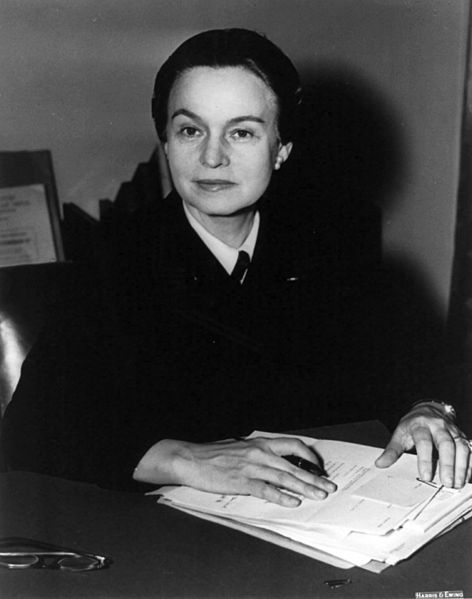 Oveta Culp Hobby (right). Image from the New York World-Telegram and the Sun Newspaper Photograph Collection.
Oveta Culp Hobby (right). Image from the New York World-Telegram and the Sun Newspaper Photograph Collection.
Born: 1905 (Killeen)
Died: 1995 (Houston)
Noted For: Oveta Culp Hobby was a civil servant, journalist, and politician noted as the director of the Women’s Army Corps; as the first secretary of the Department of Health, Education and Welfare; and as an early president of the Texas League of Women Voters.
The road to the Texas House of Representatives…
Although Oveta Culp Hobby wasn’t quite old enough to vote when the 19th Amendment was ratified, she was likely already considering how she was going to wield her voting power—and marshal the voting power of others—long before she cast her first ballot.
Oveta’s mother set an early example of community service, while her father, an attorney who served in the Texas legislature, encouraged a keen interest in politics. In 1925, following two years’ study at Baylor Female College (today the University of Mary Hardin-Baylor), Oveta went to work as a legislative parliamentarian for the Texas House of Representatives, a position she held until 1933.
During this era, she joined the ranks of other Texas women who were leveraging their still-new voting enfranchisement to find their place in politics, serving on the U.S. Senate campaign for Tom Connally and helping to organize the 1928 National Democratic Convention in Houston. In 1929, she ran for a seat in the Texas House, but was defeated by a Klan-backed candidate. This experience triggered a shift in Oveta’s career trajectory, and she eventually took a job in the circulation department of the Houston Post, later acquired by the Houston Chronicle.
It was around this time that Oveta became reacquainted with family friend William P. Hobby, the newspaper’s president and the former governor of Texas (who had also signed the first law allowing Texas women to vote.) The pair married in 1931, the same year that Oveta became president of the Texas League of Women Voters. Oveta would go on to fill a number of roles at the Post, including bylining a nationally syndicated Sunday column about parliamentary procedure. The Hobbys eventually purchased both the newspaper and a Houston radio station and TV station, KRPC. Oveta later became the top executive of all three media companies.
Wartime and post-war leadership…
In 1941, as the U.S. readied for potential entry into the world war, Oveta was tapped to head the Women’s Interest Section in the War Department Bureau of Public Relations, where she was charged with identifying ways that women could serve the U.S. war effort. After the creation of the Women’s Auxiliary Army Corps (WAAC), Oveta was named its first director, and when the WAAC was eventually integrated into the U.S. Army she entered with the rank of colonel.
The members of the WAAC were the first women (other than nurses) to wear army uniforms and receive army benefits. During her tenure, Oveta lobbied for equal treatment, training and job assignments for the women under her command. In 1945, the army awarded Oveta the Distinguished Service Medal, marking the first time the honor was conferred upon a woman.
After returning to the Post at the war’s end, Oveta remained active in politics, and in 1953 she was appointed by President Dwight Eisenhower to serve as the secretary of the newly-created Department of Health, Education, and Welfare, where she oversaw the distribution of the first polio vaccine in the U.S.
She continued her activities in publishing and public service for many years following, including another presidential appointment (this time from Lyndon B. Johnson) on the National Advisory Commission on Selective Service, as well as a stint on the board of directors at Rice University.
Throughout her career, Oveta was noted for her stamina and work ethic, her ability to remain calm in a crisis, and her advocacy for equal treatment for all. She was singled out for many awards and honors during her lifetime and afterwards, including induction into the Texas Women’s Hall of Fame and the National Women’s Hall of Fame, honorary degrees, and commemoration on a U.S. Postage stamp in 2011. There are also a number of facilities named in her honor, including the library at Central Texas College, and an elementary school in Killeen, and the Oveta Culp Hobby Soldier and Family Readiness Center at Fort Hood.
Additional Learning:
“Memories of Oveta Culp Hobby”: By Senator Kay Bailey Hutchinson

